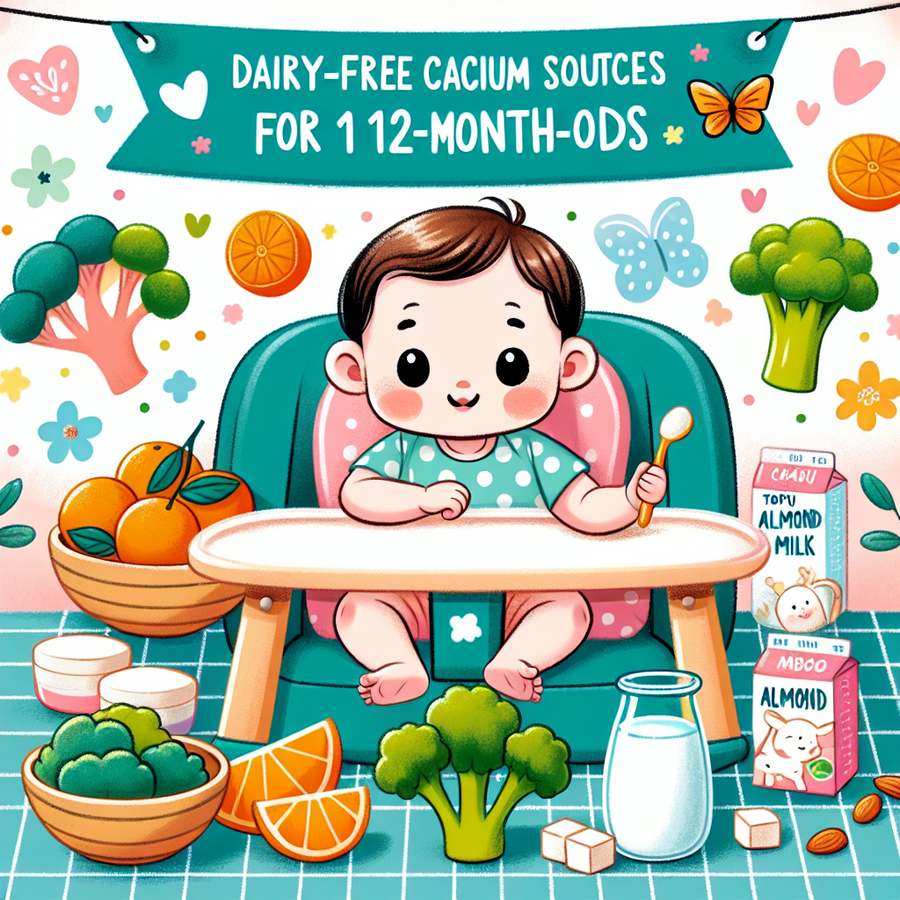Finding the right Dairy-Free Calcium Sources for 12-Months-Old can be a challenge for parents who are navigating their child’s dietary needs, especially when transitioning from breast milk or formula to solid foods. Calcium is vital for building strong bones and teeth, and it plays a critical role in nerve function, muscle development, and heart health. For those little ones with dairy allergies, lactose intolerance, or for families following a vegan lifestyle, ensuring adequate calcium intake without dairy requires a bit of creativity and knowledge.
Understanding Calcium Needs for Your 12-Month-Old
At 12 months, babies enter a crucial stage of development where the demand for calcium is high. The Centers for Disease Control and Prevention suggests toddlers aged 1-3 years require about 700 mg of calcium daily. This is a significant amount, considering the usual dietary restrictions at this age.
Parents must become savvy in identifying high-calcium foods that are dairy-free to meet their child’s needs. It’s also essential to understand that calcium absorption can be affected by other dietary factors, such as the presence of vitamin D, which enhances calcium absorption, and certain foods that might inhibit it.
Dairy-Free Calcium Sources for 12-Months-Old
Thankfully, several nutritious and easily accessible foods can help meet the calcium needs of your dairy-free toddler. Here are some top choices:
- Fortified plant-based milks (such as almond, soy, or oat milk) – These are often enriched with the same amount of calcium as cow’s milk.
- Tofu – Particularly calcium-set tofu is an excellent source of calcium and can be easily incorporated into your baby’s meals.
- Leafy green vegetables – Kale, collard greens, and broccoli are not only high in calcium but also in other essential nutrients.
- Almonds and almond butter – Great for snacking or adding to meals for an extra calcium boost.
- Oranges and orange juice – Besides being a good source of vitamin C, oranges and fortified orange juice can also contribute to your baby’s calcium intake.
- Sesame seeds and tahini – These can be sprinkled on various dishes or used in dressings.
Integrating these foods into your child’s diet can be simple and delicious. For instance, incorporating tofu into fruit smoothies or serving steamed broccoli as a finger food can make for a nutrient-rich snack or meal component.
Maximizing Calcium Absorption in Dairy-Free Diets
While identifying dairy-free calcium sources is one part of the puzzle, ensuring your baby’s body can absorb this calcium is equally important. Vitamin D plays a crucial role in calcium absorption, so including vitamin D sources or ensuring safe sun exposure can help your child’s body utilize the calcium more efficiently.
Additionally, some foods can inhibit calcium absorption, such as those high in oxalates (like spinach and certain beans) or phytates (found in whole grains). While these foods are nutritious and should not be completely avoided, it’s wise to balance them with calcium-rich foods throughout the day to optimize nutrient absorption.
In conclusion, ensuring a sufficient intake of Dairy-Free Calcium Sources for 12-Months-Old is crucial for your child’s development and long-term health. By incorporating a variety of calcium-rich, dairy-free foods into their diet and being mindful of factors that affect calcium absorption, you can support your baby’s growth and bone health without relying on dairy products. Remember, always consult with a pediatric nutritionist or healthcare provider to tailor dietary choices to your child’s specific needs and health conditions.
For more guidance on introducing solid foods and managing dietary restrictions for your baby, consider exploring our articles on introducing solid foods to a 6-month-old baby with allergies, vegan baby nutrition plan for the first year, and lactose intolerance in infants: signs and solutions.













